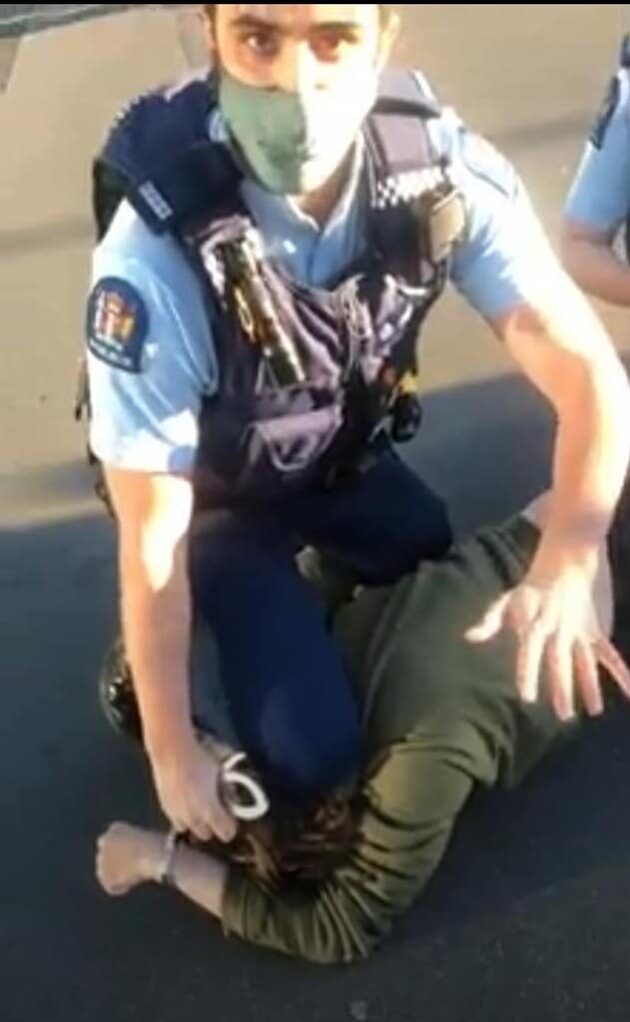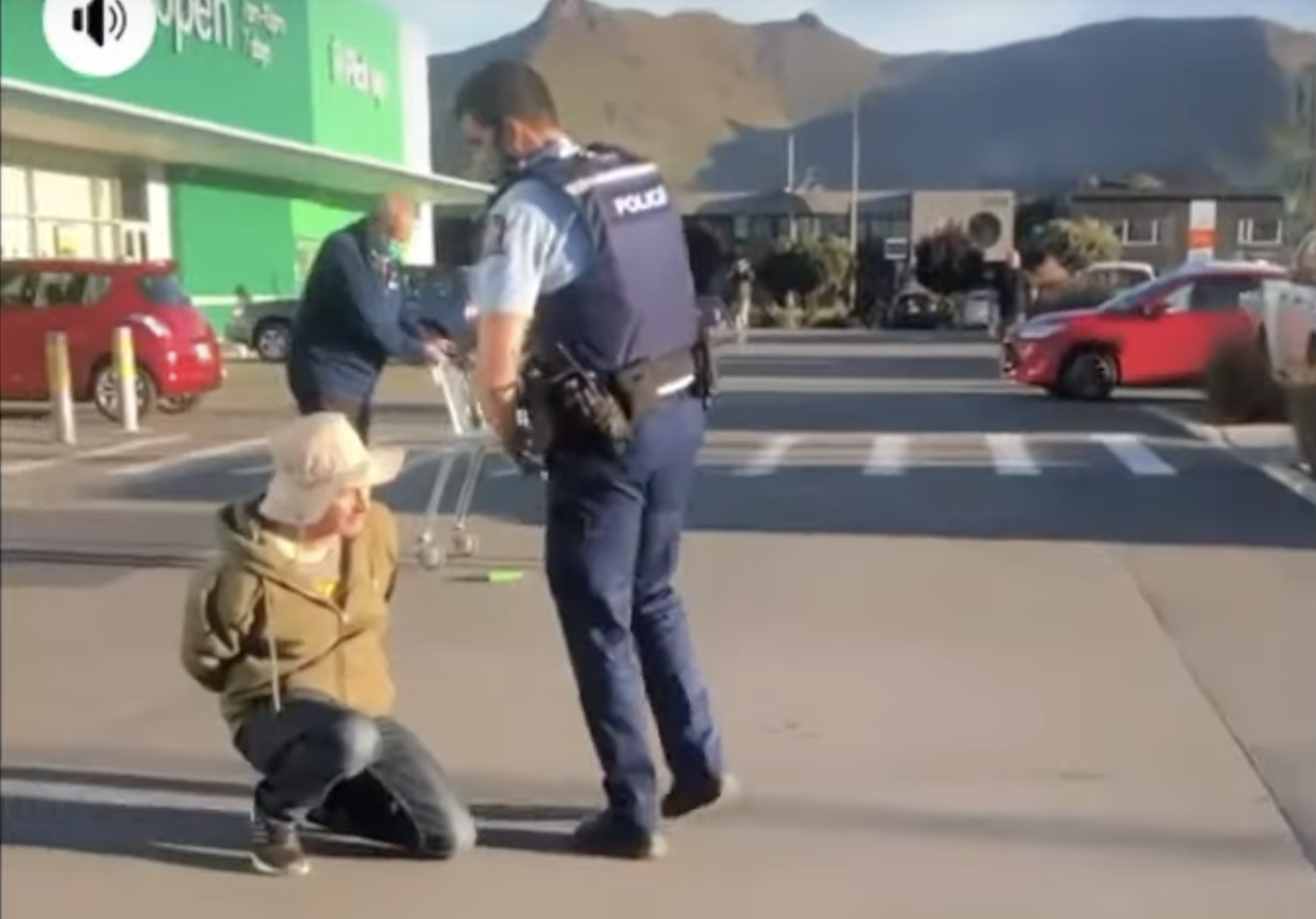The BFD has several ex-Police officers who advise us from time to time on Policing matters. They have provided the following observations regarding the arrest of a man in Christchurch for not wearing a mask.

Relevant legislation:
S.315 of the Crimes Act 1961 allows for arrest without a warrant.
S.3 of The Summary Offences Act 1981 deals with Disorderly Behaviour
S.23 of The Summary Offences Act 1981 deals with Resisting Police
S.3 of The Trespass Act 1980 deals with Trespass after a warning to leave
The information is a bit sketchy as the videos don’t show the entire incident, but this shouldn’t have been a high-stress situation.
The staff inside Countdown seemed pretty relaxed about the whole thing, if a little bit uncomfortable, and they simply carried on with their work. The information given to Police should have been that there was a man not wearing a mask who had been told he couldn’t shop without one. It was hardly call out the Armed Offenders Squad stuff, unless the informant (the Countdown manager) gave an exaggerated version of events.
From the video inside Countdown, the man was probably being a bit of dick, but he hadn’t raised his voice, hadn’t threatened anyone, and had been almost completely ignored by the staff inside. At no time in the video do you hear any of the staff telling him to leave or that he had trespassed, and the duty manager keeps walking away from him. From his point of view, he was seeking answers to reasonable questions.
Generally speaking, unless there is an imminent threat, Police would go and speak to both parties, in this case, the manager from Countdown and the other person involved. They would obtain details from both and a view of the situation from both sides, then have a brief discussion about what both sides have said and work out a way to resolve the situation at the lowest level possible.
A business or person can trespass anyone from a place if they are the lawful occupier. The manager from Countdown is a “lawful occupier” and would have the authority to trespass someone, so there is no issue there.
Let’s say for argument’s sake that the manager told the man that he had to leave the premises and he was trespassed, what happened next? He left. Maybe not immediately, but he still left. When the Police arrived, he was in the car park with his son, probably going to his car to leave.
According to the man, Police never spoke to him before arresting him, just told him he was under arrest. When he asked “what for” he was told “civil disobedience”. Not trespass, not disorderly behaviour, two of the things he was eventually charged with. None of the Police obtained his details or asked for his side of the story. Is there any Act or statute giving the power of arrest for “Civil disobedience”?
Arrest should only ever be used as a last resort by Police. Depriving someone of their liberty is a big thing, this was drummed into all new cops from day one. It could easily be argued that there were many lower-level options available to Police here. De-escalate, discuss the situation with the person in question, explain that Countdown had a policy of customers wearing a mask inside when shopping and that Countdown could refuse to serve him even if he had an exemption. He had stated that he was trying to buy medicine, perhaps there was a medical situation he needed something for? If he was unreasonable or became aggressive then perhaps arrest could then be justified.
When someone is arrested and force is used to carry out that arrest, the officers involved must fill out a Tactical Options Report justifying the level of force used and how they arrived at the decision to arrest.
The report of this arrest would make very interesting reading.
- How do the police officers justify arresting the man?
- How do they justify the level of force used?
- Why did they consider pepper spray necessary to effect the arrest?
Especially when there were three officers present and only one “offender” who didn’t appear to be armed or aggressive. All of the offences he ended up being charged with are summary offences, meaning very low level penalties.
NZ police have a Tactical Operations framework model (pdf), and an Operational Threat Assessment guide called TENR (pdf). If you look at these, the use of pepper spray is relatively high on the list of available responses, just below taser and firearms.
Police are criminally liable for any excessive force used. Anyone involved in making that arrest watching it played back should be very uncomfortable. Police hierarchy should be very uncomfortable watching it also.
S.39 of the Crimes Act 1961 allows for use of force by police, but only “such force as may be necessary to overcome any force used” in resisting arrest, unless the arrest can be made “by reasonable means in a less violent manner”.
This was a complete cluster whatsit of an incident. It looks very much like some very inexperienced cops did not take a few minutes to get a proper handle on the incident and, as a result, they came in at a high level. I can’t see an experienced cop wanting to waste any more time than was necessary on an incident like this; a more experienced cop would likely approach the situation at the lowest level possible, elevating if necessary based on the “offender’s” behaviour. This should have been dealt with by taking the “offender’s” details, giving him a trespass notice, and telling him to bugger off and not come back.
Now they are in the unenviable position of having a defended hearing, an IPCA complaint and possibly more, all for someone not wearing a mask.
Please share this article so others can discover The BFD.

